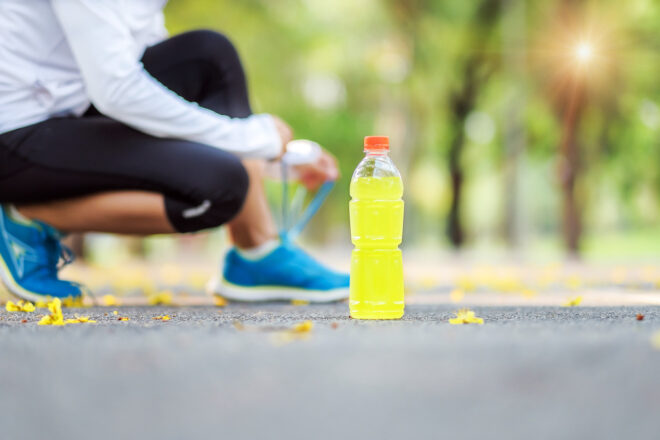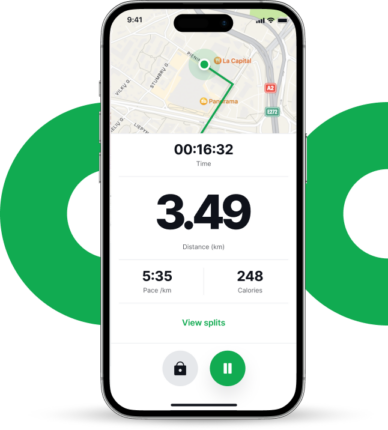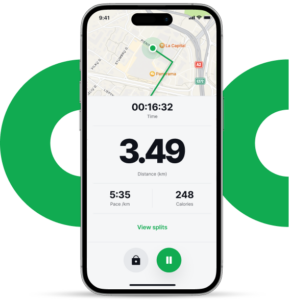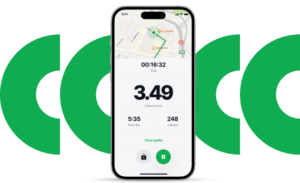If you’ve ever drunk Gatorade later in the day, you may have wondered, “Is there caffeine in Gatorade?” and “Will it keep me awake?”
Gatorade is one of the best-known sports drinks today. But it’s not a new brand. It was initially developed in 1965 at the University of Florida to boost the performance of the university football team, the Gators. Two years later, the Gators won the Orange Bowl.
So, how much caffeine does Gatorade have, and does that make it effective as a sports drink?
In this post, we explain what exactly Gatorade contains, how much you can drink safely, and how to best keep yourself hydrated during running.
In This Article
In This Article:
Should You Drink Gatorade or Water After Sports?
Gatorade contains water as well as electrolytes, which you lose through sweat when you exercise. In theory, at least, Gatorade can provide more nourishment than water.
But we’ll see later how long you train matters. So the answer is not clear-cut. Gatorade is not necessarily a better drink than water after sports.
Several studies find Gatorade effective as a sports drink, with most research based on the performance of serious athletes. However, many of these studies have been funded by the industry, including the Gatorade brand itself.
According to this research paper, industry-funded research studies were more likely to find favorable results than studies not backed by the sports drink industry.
Does Gatorade Have Caffeine?
Currently, Gatorade does not contain caffeine. But a drink “fueled” by Gatorade, the BOLT24 Energize + Caffeine, does.
Caffeine is a stimulant that may boost athletic performance. However, because of concerns that excessive consumption of caffeine can cause cardiac arrhythmia, it’s not usually included in sports drinks.
The Gatorade caffeine content may be zero, but what drinks have the most caffeine? According to data from the Center for Science in the Public Interest, energy drinks have the most caffeine, with 2.5oz of Redline Max 300 7-Hour Energy Boost and 12oz of Redline Cognitive Candy having 300mg of caffeine.
Coffee is the next biggest source of caffeine, with as much as 410mg of caffeine for the 20oz. venti Starbucks Coffee, Pike Place Roast.
Of all teas, yerba mate is the richest source, having as much as 150mg of caffeine per 16oz.
Soft drinks like Pepsi, Mountain Dew, or Coca-Cola all have caffeine. Whether regular, diet, or zero sugar, they pack up to 69mg of caffeine per 12oz.
Caffeinated water can also be a significant source of caffeine, packing up to 100mg per 8–16oz.
What Does Gatorade Contain?
If Gatorade doesn’t have caffeine, what does it have? Gatorade offers 14 grams of carbohydrates per serving compared to 25 grams in orange juice and 27 grams in Coca-Cola. Gatorade also has water, sucrose, dextrose, citric acid, and flavoring and coloring agents.
Water and some minerals aside, sugar in the form of sucrose and dextrose make up most of Gatorade. That can be a problem, especially considering that in the last three decades, the intake of sugary drinks has increased with the greater availability of sports drinks.
Does Gatorade have electrolytes?
Gatorade has sodium and potassium, two key electrolytes that help regulate the body’s fluid balance. When you run or exercise, you sweat out electrolytes. A 12fl oz serving of Gatorade Thirst Quencher has 160mg of sodium and 50mg of potassium.
Does Gatorade have benzene?
No. Benzene is a chemical with a sweet odor that increases the risk for certain cancers. It’s thought to form as a reaction between vitamin C and the preservative benzoate. Gatorade contains neither of these.
Risks of Drinking Too Much Gatorade
Gatorade was formulated as a sports drink for intense physical activity. Its sugar content, while lower than that of other sports drinks, can add up.
The increase in sugary drink consumption among children may contribute to weight gain in adulthood and increase the risk for heart disease and type 2 diabetes. It may increase weight when consumed regularly.
What about Gatorade Zero? Is it OK to drink Gatorade Zero every day? Gatorade Zero is sugar-free. However, it uses artificial sweeteners and artificial colors.
It has the zero-calorie sweeteners sucralose and acesulfame K. In some studies, these sweeteners have been associated with migraines, insulin resistance, and gut microbiome disturbances.
Whether sweetened or unsweetened, Gatorade uses different color dyes, including Blue 1, Yellow 5, and Yellow 6. These artificial dyes have been linked with DNA damage, carcinogenic contaminants, and the formation of tumors.
Will Gatorade Keep You Awake?
As we’ve seen, Gatorade doesn’t have caffeine. Unlike energy drinks, it doesn’t act as a stimulant. Drinking Gatorade in the evening is not likely to keep you awake.
However, because it contains plenty of sugar, it will boost your energy levels. This may make you feel alert, but the effect should not last long.
Is Gatorade Good for Your Body?
Drinking Gatorade during or after running or exercising for an extended period can help your body replenish lost electrolytes, rehydrate you, and refuel you with carbs.
If you’re wondering why Gatorade is bad for you or why Gatorade is banned in Europe (in some countries at least), it’s mostly because of artificial coloring agents. Gatorade, like any sports drink, is also bad for you if you simply drink too much of it.
The bottom line is that Gatorade isn’t water with perks. It’s not a substitute for water. While popular, it’s not necessarily the best hydration drink for runners.
Does Gatorade Actually Hydrate?
Gatorade contains both water and electrolytes, key nutrients the body loses during exercise. Some research shows that sports drinks like Gatorade may hydrate better than water athletes who exercise for more than 60 minutes in hot conditions.
However, for non-athletes or people exercising for less than 60 minutes, there’s no evidence that Gatorade hydrates better than water or other sports drinks.
What’s more, the extra dose of sugar and sodium can contribute to tooth decay, weight gain, and high blood pressure.
How to Keep Yourself Hydrated During Running
Keeping yourself hydrated during long runs is crucial to performing at your best, avoiding cramps, and recovering fast. But you want to choose your drink with care.
The best hydrating drinks for runners aren’t necessarily sports drinks or those with the most marketing behind them.
The best electrolyte drink is sugar-free. It doesn’t load you with artificial sweeteners and flavorings.
Look for a drink without sweeteners that brings together a balanced mix of electrolytes, including magnesium for muscle recovery and calcium for bone support.
Joggo combines six electrolytes with key vitamins like vitamin C, D, and E. Available as a powder, you can mix a scoop with 8–16oz of water for a delicious and refreshing drink. You can carry it in your water bottle or enjoy it after your run.Learn more about Joggo Hydration & Recovery and how it can help you become the best runner you can be.
Frequently Asked Questions
Is it OK to drink Gatorade everyday?
It is not recommended to drink Gatorade every day. Gatorade is a sports drink that is designed to help replenish electrolytes and fluids lost during exercise. It is not necessary to drink Gatorade every day, and doing so could actually be harmful to your health. Gatorade is high in sugar and calories, and drinking it too often can lead to weight gain and other health problems.
If you are not exercising strenuously every day, then you do not need to drink Gatorade. Water is a perfectly adequate beverage for most people. If you are exercising strenuously, then you may need to drink Gatorade or another sports drink to replenish your electrolytes.
Are there any health benefits to drinking Gatorade?
Yes, there are some potential health benefits to drinking Gatorade. Gatorade can help to:
- Replenish electrolytes: Gatorade is high in electrolytes, which are minerals that are lost through sweat during exercise. Electrolytes help to regulate fluid balance, nerve function, and muscle contractions.
- Improve hydration: Gatorade can help to rehydrate you faster than water. This is because the sugar and electrolytes in Gatorade help to draw water into the bloodstream.
- Improve performance: Gatorade may improve athletic performance by providing the body with the nutrients it needs to work harder.
Does Gatorade hydrate you better than water?
Gatorade can hydrate you better than water in some situations. For example, if you are exercising strenuously for a long period of time, then Gatorade may be a better choice than water. This is because the sugar and electrolytes in Gatorade help to draw water into the bloodstream.
However, if you are not exercising strenuously, then water is a better choice than Gatorade. Water is calorie-free and does not contain any added sugar or electrolytes.
Which Gatorade is the healthiest?
The healthiest Gatorade is the one that has the lowest sugar content. Gatorade G2 has half the sugar of regular Gatorade, and it is still a good source of electrolytes. If you are trying to lose weight or avoid sugar, then Gatorade G2 is a good option.
Otherwise, the healthiest Gatorade is the one that you enjoy the most and that fits into your diet.
How much caffeine is in a Gatorade thirst quencher?
According to PepsiCo, the company that owns Gatorade, the caffeine content of Gatorade Thirst Quencher is 23.6 milligrams per 12-ounce can. This is equivalent to about half the caffeine content of a can of Coke or Pepsi.
Gatorade Thirst Quencher is not considered a highly caffeinated beverage. However, it is important to be aware of the caffeine content of any beverage you consume, especially if you are sensitive to caffeine or are pregnant or breastfeeding.
References:
- Coombes, J.S. and Hamilton, K.L., 2000. The effectiveness of commercially available sports drinks. Sports Medicine, 29, pp.181-209.
- Cohen, D., 2012. The truth about sports drinks. Bmj, 345.
- Shirreffs, S.M., 2009. Hydration in sport and exercise: water, sports drinks and other drinks. Nutrition bulletin, 34(4), pp.374-379.
- Maughan, R.J. and Murray, R. eds., 2000. Sports drinks: basic science and practical aspects. CRC Press.
- Von Duvillard, S.P., Arciero, P.J., Tietjen-Smith, T. and Alford, K., 2008. Sports drinks, exercise training, and competition. Current sports medicine reports, 7(4), pp.202-208.
- Van Nieuwenhoven, M.A., Brouns, F.J.P.H. and Kovacs, E.M.R., 2004. The effect of two sports drinks and water on GI complaints and performance during an 18-km run. International journal of sports medicine, pp.281-285.
- Coso, J.D., Estevez, E., Baquero, R.A. and Mora-Rodriguez, R., 2008. Anaerobic performance when rehydrating with water or commercially available sports drinks during prolonged exercise in the heat. Applied Physiology, Nutrition, and Metabolism, 33(2), pp.290-298.














